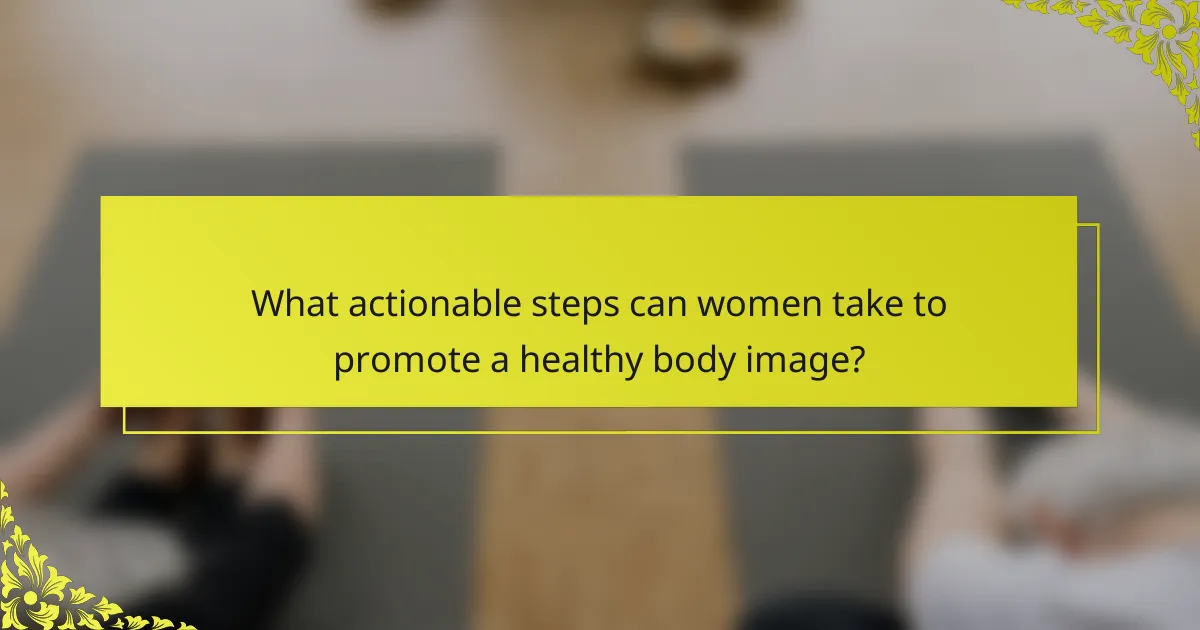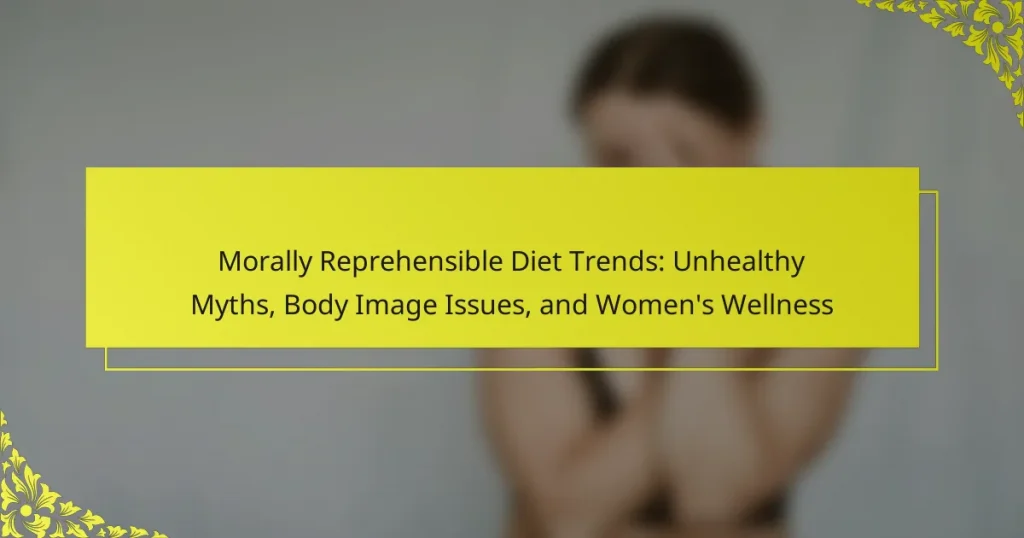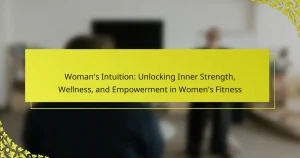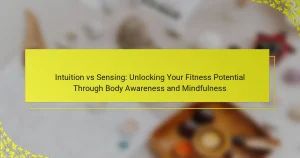Morally reprehensible diet trends undermine women’s wellness by spreading unhealthy myths and fostering body image issues. These trends promote extreme restrictions and disordered eating behaviours. Social media exacerbates body dissatisfaction by showcasing unrealistic beauty standards. To combat these challenges, women can practice self-compassion, engage in positive self-talk, and focus on overall wellness rather than weight.

What are the morally reprehensible diet trends affecting women’s wellness?
Morally reprehensible diet trends negatively impact women’s wellness by promoting unhealthy myths and body image issues. These trends often emphasize extreme restrictions, leading to disordered eating behaviours. For instance, the “clean eating” trend can create guilt around food choices, fostering anxiety and unhealthy relationships with food. Additionally, the rise of detox diets can lead to nutrient deficiencies and metabolic imbalances, further compromising health. Social media perpetuates these trends, showcasing unrealistic body standards, which can exacerbate body dissatisfaction among women.
How do unhealthy diet myths impact women’s body image?
Unhealthy diet myths negatively impact women’s body image by promoting unrealistic standards. These myths create pressure to conform to specific body types, leading to dissatisfaction and low self-esteem. Studies show that exposure to idealised images correlates with increased body dissatisfaction among women. As a result, these myths contribute to a cycle of unhealthy behaviours, such as disordered eating and excessive dieting. Addressing these myths is essential for improving women’s wellness and fostering a positive body image.
What are the psychological effects of restrictive dieting on women?
Restrictive dieting can lead to significant psychological effects on women, including anxiety, depression, and negative body image. These diets often promote unattainable standards, resulting in low self-esteem and disordered eating patterns. Research indicates that women subjected to restrictive diets may experience increased emotional distress and a distorted perception of their bodies. This cycle can perpetuate unhealthy relationships with food and exacerbate mental health issues. As a result, women’s overall wellness is compromised, emphasising the need for a balanced approach to diet and self-acceptance.
How do societal standards shape women’s perceptions of dieting?
Societal standards significantly influence women’s perceptions of dieting, often promoting unrealistic body ideals. These standards create pressure to conform, leading to unhealthy dieting practices. Research shows that exposure to idealised body images can result in negative body image and disordered eating behaviours among women. As a result, many women may prioritise appearance over health, adopting diets that are morally reprehensible and detrimental to their overall wellness. This cycle perpetuates body image issues and reinforces harmful myths about dieting.
What role does social media play in promoting diet culture?
Social media significantly promotes diet culture by spreading unhealthy myths and influencing body image perceptions. Platforms amplify unrealistic beauty standards, leading to increased pressure on women to conform. Research indicates that exposure to idealised images correlates with body dissatisfaction and disordered eating behaviours. The rapid sharing of diet trends, often lacking scientific validation, perpetuates these harmful narratives. As a result, social media becomes a breeding ground for morally reprehensible diet trends, impacting women’s wellness negatively.
What are the most common unhealthy diet myths?
Many diet myths persist, leading to unhealthy beliefs about food and body image. Common myths include the idea that all fats are bad, which overlooks healthy fats’ benefits. Another myth is that skipping meals aids weight loss, but it often results in overeating later. The belief that carbs are the enemy ignores the importance of complex carbohydrates for energy. Lastly, detox diets are often promoted as a quick fix, yet they can harm the body and disrupt natural processes. These myths can negatively impact women’s wellness and body image.
What are the misconceptions about fat loss diets?
Many misconceptions about fat loss diets perpetuate harmful beliefs. Common myths include the idea that all fats are bad, which ignores healthy fats’ role in nutrition. Another misconception is that drastic calorie restriction leads to sustainable weight loss, disregarding the importance of balanced nutrition. Additionally, the belief that certain foods can “burn fat” oversimplifies the complex process of fat loss, promoting unrealistic expectations. These myths can negatively impact body image and women’s wellness, contributing to unhealthy dieting behaviours.
How do detox diets mislead women about health?
Detox diets mislead women by promoting unrealistic health expectations. These diets often promise rapid weight loss and detoxification, but they can lead to nutrient deficiencies and disordered eating. Many detox diets lack scientific backing, relying on myths that undermine women’s wellness and body image. As a result, women may feel pressured to conform to unattainable standards, ultimately harming their physical and mental health.
What are the dangers of fad diets for women’s health?
Fad diets pose significant dangers to women’s health, including nutritional deficiencies and negative body image. These diets often promote extreme restrictions, leading to inadequate intake of essential nutrients. As a result, women may experience fatigue, weakened immune systems, and hormonal imbalances.
Additionally, fad diets can exacerbate mental health issues, promoting unhealthy relationships with food and body image. Many women feel pressured to conform to unrealistic standards, resulting in anxiety and disordered eating patterns.
In conclusion, the pursuit of quick fixes through fad diets undermines women’s wellness, emphasising the need for balanced, sustainable eating habits.
What unique challenges do women face regarding body image?
Women face unique challenges regarding body image due to societal pressures, unrealistic beauty standards, and the impact of social media. These factors contribute to body dissatisfaction and mental health issues. For example, studies show that 80% of women feel pressure to conform to certain body ideals, leading to unhealthy dieting behaviours. Additionally, the prevalence of “fitspiration” culture often promotes restrictive eating habits, further complicating women’s relationship with food and self-image. Addressing these challenges requires a shift towards promoting body positivity and realistic representations of women’s bodies in media.
How do hormonal changes influence body image perception?
Hormonal changes significantly affect body image perception, often leading to distorted self-views. Fluctuations in hormones, particularly during puberty, menstruation, pregnancy, and menopause, can amplify feelings of insecurity and dissatisfaction with one’s body. For instance, oestrogen and progesterone levels influence mood and self-esteem, impacting how women perceive their bodies. As a result, many women may adopt morally reprehensible diet trends in an attempt to conform to societal beauty standards, exacerbating body image issues. These unhealthy myths can lead to detrimental effects on women’s overall wellness, further complicating their relationship with their bodies.
What are the cultural influences on women’s body image?
Cultural influences significantly shape women’s body image, often leading to unhealthy diet trends. Media portrayal of idealised body types creates unrealistic standards, fostering body dissatisfaction. Social media amplifies these pressures, promoting comparison and reinforcing negative self-perceptions. Additionally, cultural norms around beauty and femininity can dictate dietary choices, pushing women toward restrictive eating practices. As a result, these influences contribute to a cycle of unhealthy body image and wellness challenges.
What rare but notable diet trends should women be aware of?
Certain rare diet trends can negatively impact women’s wellness and body image. One notable example is the “Cabbage Soup Diet,” which promotes rapid weight loss but lacks essential nutrients. Another trend is the “Master Cleanse,” a liquid-only detox that may lead to nutrient deficiencies. These diets can perpetuate unhealthy myths about weight loss and beauty standards. Women should prioritise balanced nutrition over these extreme approaches to foster a healthier body image and overall wellness.
How do extreme diets affect women’s long-term health?
Extreme diets can significantly harm women’s long-term health by causing metabolic imbalances and psychological distress. These diets often promote unhealthy myths about weight loss that can lead to body image issues. Research indicates that restrictive eating patterns can increase the risk of eating disorders, anxiety, and depression. Additionally, extreme diets may result in nutrient deficiencies, affecting overall wellness and hormonal balance. Sustainable, balanced eating patterns are essential for maintaining long-term health and well-being in women.
What are the hidden dangers of diet pills marketed to women?
Diet pills marketed to women often pose serious health risks and perpetuate harmful body image issues. Many of these products contain unregulated ingredients that can lead to adverse effects, such as heart problems and anxiety. Additionally, the promotion of these pills reinforces unhealthy myths about weight loss and self-worth, negatively impacting women’s wellness. As a result, reliance on diet pills can exacerbate mental health challenges and create a cycle of unhealthy behaviours.

What actionable steps can women take to promote a healthy body image?
To promote a healthy body image, women can adopt several actionable steps. First, practice self-compassion by treating oneself with kindness and understanding. Second, engage in positive self-talk to counter negative thoughts about body image. Third, surround yourself with supportive individuals who encourage a healthy mindset. Fourth, limit exposure to media that promotes unrealistic beauty standards. Lastly, focus on overall wellness rather than weight, emphasising physical activity and balanced nutrition. These steps can significantly enhance body image and contribute to women’s wellness.
How can women identify and combat unhealthy diet trends?
Women can identify and combat unhealthy diet trends by educating themselves on the myths surrounding these diets and focusing on their overall wellness. Recognising red flags like extreme calorie restrictions or elimination of entire food groups is crucial. Additionally, promoting body positivity and seeking professional guidance can help combat the negative impacts of these trends. Engaging in community discussions and sharing experiences fosters a supportive environment that encourages healthy choices.
What are the best practices for fostering a positive body image?
To foster a positive body image, focus on promoting self-acceptance and challenging societal beauty standards. Encourage diverse representations of body types in media and support healthy lifestyle choices rather than restrictive diets. Highlight the importance of self-care practices, such as mindfulness and positive affirmations, which can enhance self-esteem. Additionally, educate individuals on the harmful effects of diet trends that perpetuate negative body image, emphasising wellness over weight.
What expert insights can help women navigate diet culture effectively?
To navigate diet culture effectively, women should focus on rejecting harmful myths and fostering a positive body image. Understanding that diet trends often promote unattainable standards is crucial. Emphasising wellness over weight loss can lead to healthier choices. Additionally, seeking support from communities that prioritise body positivity can enhance resilience against societal pressures.




